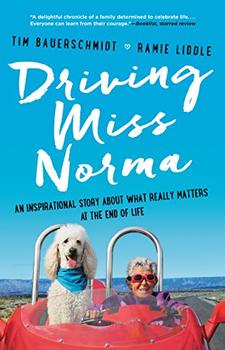Summary | Excerpt | Reading Guide | Reviews | Beyond the book | Read-Alikes | Genres & Themes | Author Bio

It was over four years ago when Will Schwalbe captured book lovers' hearts around the world with his stunning The End of Your Life Book Club, a story describing the "book club" between himself and his mother, who was battling terminal cancer. It was met with enthusiastic praise from critics and readers alike. It's hard to follow something so special, but he's done it with Books for Living. And I'll go ahead and tell you that it was well worth the wait.
Schwalbe returns with his gentle, accessible writing style as he brings together twenty-six essays, each exploring a book he's read and the key lesson it taught him. The compilation touches on a number of issues, but one singular focus brings it all together: explaining how and why books are important.
From the introduction, it's clear that he is a book man. He cares about words and the stories they tell. He's weary of technology and the restrictions it creates. He writes, "There are, however, questions that the Internet and the hive mind are spectacularly unable to answer to my satisfaction. These are the big ones, the ones that writers have been tackling for thousands of years: the problem of pain, meaning, purpose, happiness. Questions about how to live your life." Schwalbe lets us in on the secret: literature is the answer. Books for Living mentions works from various genres, including cookbooks, children's literature, classics from the traditional canon, recent releases, and lesser known works. Even for the most well-read readers, there are likely a few new titles.
As in almost any collection, some of the essays are stronger than others. One particularly riveting piece discusses the theme of searching in E. B. White's popular children's novel Stuart Little. Schwalbe describes his relationship with a pet gerbil as a young boy and how it made him want to leave home because the pet didn't give him what he thought it should. He was searching for something that the gerbil could never give him. He equates his experience to the one central to the book: "I think I may have sensed even back then that at its heart Stuart Little is a tale of radical acceptance – you can be whatever or whoever you are born to be and not risk losing your family. Every child is in some ways different from her or his parents – even if not so different as Stuart was from his." Searching for understanding and acceptance helps resolve the novel's story; and in a similar way it solved Schwable's own childhood issue.
The essay on choosing kindness, which focuses on R. J. Palacio's Wonder, is another powerful read. Schwalbe says the book made him "want to be a better person." Another shorter piece that's particularly good is about disconnecting, which is structured around George Orwell's 1984. It makes a stirring case for removing ourselves from our electronic devices and social media. Schwalbe makes this observation: "How often do I hear silence? Between the buds in my ears when I'm out and the screens that are on when I'm in, the answer is simple: hardly ever. I miss it. It's hard to remember what it sounds like and all the possibilities it allows. Maybe that's the real tyranny of the smartphones and all the little screens everywhere. They help us rob ourselves of silence."
Some of the essays are funny, and some are sad. Some are calls for action, while others seem more personal and self-reflective. Still, each piece speaks to the importance of literature and how reading books can help us live better lives.
Books for Living isn't as emotional or consuming as The End of Your Life Book Club, but few books are. What we have, instead, is a book asking us to think – yes, to think about what we are reading – but more specific than that, begging us to think about how what we are reading can make us better people and lead richer lives. And that's something to celebrate.
![]() This review was originally published in The BookBrowse Review in January 2017, and has been updated for the
September 2017 edition.
Click here to go to this issue.
This review was originally published in The BookBrowse Review in January 2017, and has been updated for the
September 2017 edition.
Click here to go to this issue.

If you liked Books for Living, try these:

by Tim Bauerschmidt, Ramie Liddle
Published 2018
Infused with this irrepressible nonagenarian's wisdom, courage, and generous spirit, and filled with sixteen pages of color photographs, Driving Miss Norma reminds us that life is beautiful and precious, and that family, fun, and self-discovery can happen at any age.

by Elizabeth D. Samet
Published 2008
What does literature - particularly the literature of war - mean to a student who is likely to encounter its reality? What is the best way to stir uninhibited classroom discussions in a setting that is designed to train students to follow orders, respect authority, and survive grueling physical and mental experiences? This is the terrain Samet ...
Your guide toexceptional books
BookBrowse seeks out and recommends the best in contemporary fiction and nonfiction—books that not only engage and entertain but also deepen our understanding of ourselves and the world around us.